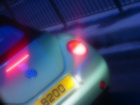Speeding - Our Opinion
To repeat what we say elsewhere: PePiPoo does not condone breaking the law. However, it's clear that speeding offences are now being seen as a major source of generating revenue, and this seems to be leading to an approach to the administration of justice that's focussed on "administration" rather than "justice".
 You'll find the following easier to understand if you've watched the traffic video, but we've tried to make it easy to understand if you haven't. After all, we aren't in this for the money!
You'll find the following easier to understand if you've watched the traffic video, but we've tried to make it easy to understand if you haven't. After all, we aren't in this for the money!
People have asked us "why use patrol cars to measure a vehicle's speed - why not just use speed detection equipment?". This becomes clear if you've seen the film. A court wouldn't have been interested in the true speed of the Rover; the speed of the patrol car was much more interesting!
If you're caught doing 60 mph in a 30 mph limit (even with the blues & twos on!) we don't have any sympathy for you. But the debate into speeding on motorways is ongoing, and we'd like to offer the following opinion. If "common sense" doesn't prevail soon the roads are going to become less safe as people will be paranoid about looking at their speedometer, instead of observing what is going on around them. Defensive driving will be a thing of the past. When you watch the traffic video you'll note that the driver of the Rover never uses his brakes. The same cannot be said for the supposedly highly-trained police driver with 22 years traffic experience. This story on the BBC News website suggests that they may already have succeeded in making the roads less safe! When was last time you saw a motorist "panic braking" after spotting a speed trap?
In our opinion unmarked patrol cars should only be used for recording non-speeding offences on motorways - for example dangerous driving. There's an ongoing debate within the police related to this point, and with modern technology there are far safer and much more accurate ways of recording speed than the method recorded on the traffic video.
Cars have become much safer since the introduction of the 70 mph motorway speed limit, and most accidents are related to "undue care and attention" - not speeding. The largest single contributor to motorway deaths is the driver falling asleep at the wheel. Obviously, speed is an issue if you have an accident, but as Jeremy Clarkson said, "the safest way to survive an accident is not to have it in the first place". Consideration needs to be given to the road conditions, the vehicle being driven, and the competence of the driver. Maybe we could introduce variable speed limits as in France for wet weather, etc.
Statistics show that motorways are the safest roads, so why does speeding on motorways attract by far the largest fines?
 In our case, the Rover being followed was a 620ti, and probably one of the safest cars ever to leave a British production line. It'll stop in 3 feet less than a Porsche 911 from 70 mph (it's lovingly know as the "Kinversand missile"). In the wrong hands it could be a very dangerous vehicle. Our thanks to Rover Cars, who must've had a great deal of fun turning the innocuous-looking 600 into the 620ti!
In our case, the Rover being followed was a 620ti, and probably one of the safest cars ever to leave a British production line. It'll stop in 3 feet less than a Porsche 911 from 70 mph (it's lovingly know as the "Kinversand missile"). In the wrong hands it could be a very dangerous vehicle. Our thanks to Rover Cars, who must've had a great deal of fun turning the innocuous-looking 600 into the 620ti!


Information
News
Latest forum topics


Page updated: 31 Jul 2008




